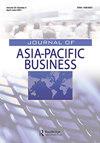Global Reach and Challenges across the Pacific
Q3 Business, Management and Accounting
引用次数: 0
Abstract
Conflict is on the horizon between China and the United States. Leading-edge US tech companies related to artificial intelligence sectors are going to be subject to more limitations as well as restrictions on Chinese multinational firms. Other sectors are likely to follow though no final US legislation is enacted. Equally the same can be said of China. The climate for direct foreign investment linkages between US and Chinese multinationals will face far more scrutiny by both the United States and China. This might not bode well for Asia-Pacific corporate linkages. Made in America is a new mantra that President Trump utters, demanding that many products from Harley-Davidson motorcycles to many goods available on the shelf at Wal-Mart be manufactured here. The Chinese have their own slogans – Made in China 2025 is uttered with equal vigor and determination by the Chinese leadership, suggesting that many sectors from robots to aerospace to others should be manufactured in the country. They deem these to be industries important to China’s new place in the global economy. President Trump also believes that a healthy manufacturing industry in various sectors should be carried out within the borders of the United States. As such, the President keeps suggesting that American companies should stay closer to home. Moreover, there is a sentiment toward further China-specific restrictions implemented by the Committee on Foreign Investment in the United States (CFIUS). This interagency is being asked to review all in-bound foreign investment, particularly from China, and the President also asked the Department of Commerce to review all US export controls. America’s inward investment restrictions and our export rules, regulations, and controls are also being increased by the Foreign Investment Risk Review Modernization Act (FIRRMA), a bipartisan law that could come in the next few months. The increasing scope of review by CFIUS will expand and strengthen and limit the controls on the export of US sensitive and high-tech industries. The United States House of Representatives has already moved in that direction. Chinese state-owned oil companies are going to be facing further scrutiny and are likely to be diminishing. If China wishes to improve its economic gross domestic product (GDP) prospects, it will further push the state-owned companies and other private firms in China to look a little more inward and focus on small businesses. Referring to CFIUS activities, of the 387 transactions reviewed by that agency focusing on Chinese inward investment to the US, some have been blocked and coupled with Chinese capital controls on Chinese money to the US. The scrutiny by that agency, as well as FIRRMA, is likely to increase. Echoes of the past are at play here. Historically, the United States Congress and CFIUS responded to the Organization of Petroleum Exporting Countries’ (OPEC) investments and Japanese investments by attempting to limit foreign, Japanese, and OPEC firms from buying into American corporations in many sectors, including the US semiconductor industry. Now the focus on China is at play. Moreover, the US Congress is demanding that CFIUS review US transfer of intellectual properties and other licensing and joint venture arrangements between US corporations and potential Chinese buyers. JOURNAL OF ASIA-PACIFIC BUSINESS 2019, VOL. 20, NO. 4, 257–259 https://doi.org/10.1080/10599231.2019.1684167横跨太平洋的全球影响力和挑战
中国和美国之间的冲突即将爆发。与人工智能领域相关的美国前沿科技公司将受到更多限制,中国跨国公司也将受到更多限制。尽管美国最终立法尚未颁布,但其它行业可能也会效仿。中国也是如此。美国和中国跨国公司之间的直接外国投资联系将面临美国和中国更加严格的审查。这对亚太企业联系来说可能不是好兆头。“美国制造”是特朗普总统的新口号,他要求从哈雷戴维森摩托车到沃尔玛货架上的许多商品都在美国制造。中国人有自己的口号——中国领导人以同样的活力和决心说出了《中国制造2025》,暗示从机器人到航空航天等许多领域都应该在中国制造。他们认为,这些行业对中国在全球经济中的新地位至关重要。特朗普总统还认为,各个领域的健康制造业应该在美国境内开展。因此,总统一直建议美国公司应该留在离家更近的地方。此外,对美国外国投资委员会(CFIUS)进一步实施针对中国的限制也有看法。这个跨部门机构被要求审查所有进入美国的外国投资,特别是来自中国的投资,总统还要求商务部审查美国所有的出口管制。《外国投资风险评估现代化法案》(Foreign investment Risk Review Modernization Act, FIRRMA)也将加强美国对外来投资的限制以及我们的出口规则、法规和控制,这项两党共同通过的法案可能在未来几个月内出台。美国外国投资委员会审查范围的扩大,将扩大、加强和限制对美国敏感和高科技产业出口的控制。美国众议院已经朝这个方向迈进。中国国有石油公司将面临进一步的审查,审查可能会减少。如果中国希望改善其国内生产总值(GDP)的前景,它将进一步推动中国的国有企业和其他私营企业向内看,把重点放在小企业上。就美国外国投资委员会的活动而言,该机构审查了387笔交易,重点是中国对美投资,其中一些交易遭到了阻止,同时中国对中国对美投资实施了资本管制。该机构和FIRRMA的审查可能会加强。过去的回声在这里嬉戏。从历史上看,美国国会和CFIUS对石油输出国组织(OPEC)和日本的投资的回应是,试图限制外国、日本和OPEC公司在许多领域收购美国公司,包括美国半导体行业。现在,人们开始关注中国。此外,美国国会要求CFIUS审查美国的知识产权转让,以及美国企业与潜在中国买家之间的其他许可和合资安排。《亚太商业杂志》2019年第20卷第1期。4,257 - 259 https://doi.org/10.1080/10599231.2019.1684167
本文章由计算机程序翻译,如有差异,请以英文原文为准。
求助全文
约1分钟内获得全文
求助全文
来源期刊

Journal of Asia-Pacific Business
Business, Management and Accounting-Business and International Management
CiteScore
2.50
自引率
0.00%
发文量
17
期刊介绍:
Present circumstances underscore the need to improve the understanding of conducting business with and within the Asia-Pacific countries. The Journal of Asia-Pacific Business™ provides a blend of cutting-edge knowledge and practical applications on business management and marketing strategy. In the Journal of Asia-Pacific Business™, you will find articles and feature sections that provide a pragmatic view of the business environment in this dynamic region. This essential resource offers readers a good blend of descriptive, conceptual, and theoretical articles dealing with current topics.
 求助内容:
求助内容: 应助结果提醒方式:
应助结果提醒方式:


